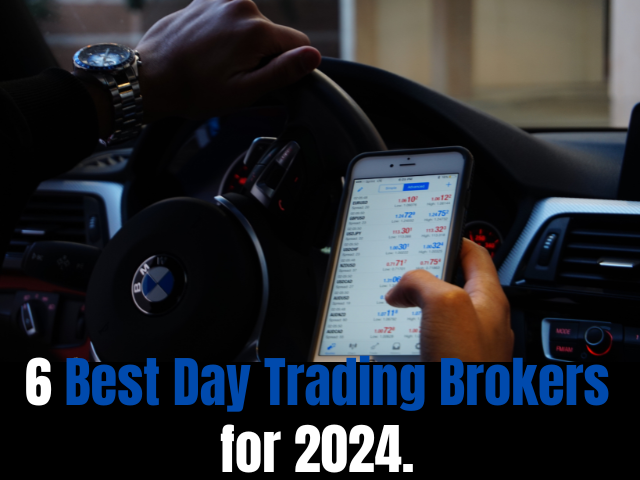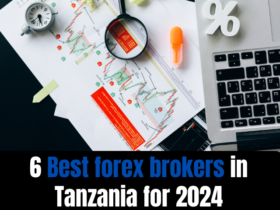If you are looking for 6 Best Day Trading Brokers for 2024 this article will be useful for you. In the fast-paced world of financial markets, day trading has emerged as a popular strategy for investors seeking to capitalize on short-term price movements. As we navigate through 2024, the landscape of day trading continues to evolve, with technology and market dynamics shaping the way traders operate.
Central to this evolution are the brokers that facilitate these rapid-fire transactions, providing the platforms, tools, and services that can make or break a day trader’s success.
This comprehensive guide delves into the world of day trading brokers, offering an in-depth look at the six best options available in 2024. Whether you’re a seasoned day trader looking to switch platforms or a newcomer eager to enter the market, this article will equip you with the knowledge to make an informed decision about which broker best suits your needs.
We’ll explore the key features that define top-tier day trading brokers, from lightning-fast execution speeds to advanced analytical tools. We’ll also discuss the regulatory landscape, fee structures, and the unique selling points of each featured broker. By the end of this guide, you’ll have a clear understanding of the current-day trading broker ecosystem and be well-positioned to choose the platform that aligns with your trading goals and style.
So, let’s dive in and discover the brokers that are setting the standard for day trading in 2024.
What is Day Trading?

Before we delve into the specifics of day trading brokers, it’s crucial to understand what day trading entails and why it has become such a popular form of investment like on Tradingview.
Day trading is a style of trading where financial instruments such as stocks, currencies, futures, or commodities are bought and sold within the same trading day. The goal is to profit from small price movements, often leveraging large amounts of capital to make these small changes meaningful.
Key characteristics of day trading include:
- Short-term positions: Day traders open and close all their positions within a single trading day, never holding positions overnight.
- High frequency: Day traders often make multiple trades per day, sometimes even dozens or hundreds.
- Technical analysis: Day traders typically rely heavily on technical analysis and chart patterns to make trading decisions, rather than fundamental analysis of companies or assets.
- Risk management: Successful day traders implement strict risk management strategies to protect their capital.
- Use of leverage: Many day traders use margin accounts to amplify their buying power and potential profits (and losses).
- Real-time data: Day traders require access to real-time market data and news to make informed decisions quickly.
Day trading can be applied to various markets, including:
- Stocks: Perhaps the most common market for day traders, especially in the U.S.
- Forex: The foreign exchange market, where currencies are traded 24 hours a day.
- Futures: Contracts for future delivery of commodities or financial instruments.
- Options: Contracts that give the right to buy or sell an asset at a specific price within a set time frame.
- Cryptocurrencies: A newer market that has attracted many day traders due to its volatility.
It’s important to note that day trading is a high-risk, high-stress activity that requires significant knowledge, skill, and emotional control. It’s not suitable for everyone, and many day traders lose money, especially in their early attempts. However, for those who develop the necessary skills and discipline, day trading can potentially offer significant returns.
This is where the choice of a suitable day trading broker becomes crucial. The right broker can provide the tools, speed, and support necessary to execute a successful day trading strategy. In the next section, we’ll discuss how to choose the right day trading broker for your needs.
How to Choose a Day Trading Broker
Selecting the right day trading broker is a critical decision that can significantly impact your trading performance and profitability. Here are the key factors to consider when evaluating potential brokers:
- Execution Speed and Reliability For day traders, every second counts. Look for brokers that offer high-speed order execution and have a track record of reliability. Check for statistics on execution speed and ask about their infrastructure for handling high-volume trading days.
- Trading Platform and Tools The trading platform is your gateway to the markets. It should be intuitive, customizable, and packed with features that support your trading style. Key elements to look for include:
- Real-time charting with multiple timeframes
- A wide range of technical indicators
- Level II quotes for detailed market depth
- Hotkeys for rapid order entry
- Risk management tools
- Paper trading or demo accounts for practice
- Market Access Ensure the broker provides access to the markets you want to trade. This could include stocks, options, futures, forex, or cryptocurrencies. Also, check if they offer access to pre-market and after-hours trading if that’s part of your strategy.
- Commissions and Fees Day trading involves frequent transactions, so even small differences in fees can have a big impact on your bottom line. Compare the fee structures of different brokers, including:
- Per-trade commissions
- Platform fees
- Data fees
- Margin rates
- Minimum balance requirements
- Margin and Leverage Many day traders use leverage to amplify their trading power. Check the margin requirements and leverage limits offered by each broker. However, be cautious – while higher leverage can increase potential profits, it also increases risk.
- Regulatory Compliance Ensure your broker is registered with the appropriate regulatory bodies. In the U.S., this typically means registration with the Securities and Exchange Commission (SEC) and membership in the Financial Industry Regulatory Authority (FINRA).
- Educational Resources and Research Even experienced traders can benefit from ongoing education and quality research. Look for brokers that offer educational materials, webinars, and detailed market research to support your trading decisions.
- Customer Support When you’re in the middle of a trading day and encounter an issue, you need responsive customer support. Check the availability and quality of customer service, including phone, email, and chat support options.
- Account Types Some brokers offer specialized accounts for day traders that may include benefits like reduced commissions or access to additional features. Investigate the different account types available and their requirements.
- Mobile Trading Capabilities In today’s fast-paced world, the ability to monitor and execute trades on the go can be crucial. Evaluate the broker’s mobile app for functionality and user-friendliness.
- Additional Features Depending on your specific needs, you might also want to consider:
- Social trading or copy trading capabilities
- Algorithmic trading support
- News feeds and economic calendars
- Integration with third-party tools and platforms
- Reputation and User Reviews Finally, research the broker’s reputation in the trading community. Look for user reviews and testimonials, but be sure to consider a range of opinions and verify claims where possible.
6 Best Day Trading Brokers for 2024
[elementor-template id=”19841″]
1: Exness Brokers

Exness has long been a favorite among professional day traders, and in 2024, it continues to set the standard for advanced trading platforms. Exness offers different day trading features on their traders every day
READ MORE: Exness Review 2024| Is Exness broker scam or legit (Honest Review)
Key Features:
- Trader Workstation (TWS): Exnes’s flagship desktop platform offers advanced charting, real-time data, and a suite of professional-grade trading tools.
- IBot: An AI-powered assistant that can execute trades and provide market information through natural language commands.
- API access: Allows for the development of custom trading algorithms and integration with third-party software.
- Global market access: Trade in over 135 markets across 33 countries.
Pros:
- Exceptionally low margin rates
- Advanced order types and algos
- Comprehensive research tools
- Strong regulatory compliance
Cons:
- The platform can be overwhelming for beginners
- Inactivity fees may apply to some account types
- Customer service has historically received mixed reviews
Pricing:
- Tiered and fixed pricing structures are available
- Stock trades as low as $0.0005 per share with a $1 minimum
- No account minimum for individual accounts
Best for Experienced day traders and professionals who require advanced tools and global market access can use Exness on day trading entry
2: XM Global

XM Global Brokerage has cemented its position as a top choice for day traders in 2024, offering a robust platform and extensive educational resources to day traders, it has many trading tools that are the key movement for any forex traders who want to change their life
READ MORE: XM Global Review 2024 |Is XM Global broker scam or legit (Honest Review)
Key Features:
- XM platform: A professional-grade trading platform with advanced charting, real-time data, and risk management tools.
- paperMoney: A virtual trading simulator for practice and strategy testing.
- Mobile trading: Fully-featured mobile apps for trading on the go.
- Educational resources: Extensive library of articles, videos, and webinars for traders of all levels.
Pros:
- Commission-free stock and ETF trades
- Excellent customer service
- Wide range of tradable assets
- Strong educational offerings
Cons:
- Higher margin rates compared to some competitors
- Advanced features may be overwhelming for beginners
Pricing:
- $0 commissions for online stock, ETF, and option trades
- $0.65 per options contract
- No account minimum
Best for Traders of all experience levels who value a balance of advanced features and educational support.
3: OCTAFX

Octafx has evolved significantly in recent years, positioning itself as a strong contender in the day trading space for 2024. If you are looking for the best day trading brokers for 2024 OctaFX is among them.
READ MORE: OctaFX Review 2024 |Is OctaFx broker scam or legit (Honest Review)
Key Features:
- Power Octafx platform: A web-based platform offering real-time data, risk management tools, and strategy optimization features.
- Octafx Pro: A downloadable platform for active traders with advanced charting and market analysis tools.
- Spectral Analysis: A unique tool that helps visualize trading opportunities based on historical data.
- Mobile app: A robust mobile trading experience with advanced features.
Pros:
- User-friendly interfaces across all platforms
- Strong options trading tools
- Excellent mobile trading capabilities
- No account minimum
Cons:
- Higher margin rates than some competitors
- Advanced platform (Octafx Pro) requires a high account balance or frequent trading
Pricing:
- $0 commissions for online stock, ETF, and options trades
- $0.65 per options contract (volume discounts available)
Octafx is the best for Day traders who prioritize ease of use without sacrificing advanced features, particularly those interested in options trading.
4: Hotforex

Hotforex caters specifically to active traders and professionals, offering some of the fastest execution speeds in the industry. Hotforex will the one of the best brokers in the world in 2024 due to high and good features with 0 trading fees compared to other forex brokers
Key Features:
- Hotforex Trader: A professional-grade desktop platform designed for speed and efficiency.
- Sterling Trader Pro: An additional platform option for high-volume equities and options traders.
- Risk management tools: Customizable controls to manage trading risk effectively.
- Direct market access: Routes orders directly to exchanges for faster execution.
Pros:
- Extremely fast execution speeds
- Advanced order types and routing options
- Competitive pricing for high-volume traders
- Specialized tools for short-selling
Cons:
- High account minimum ($10,000 for non-professional traders)
- Limited research and educational resources
- Not suitable for casual or beginner traders
Pricing:
- Per-share pricing as low as $0.0010 per share
- Flat-fee pricing option at $4.50 per trade
- Options fees from $0.50 per contract
Hotforex is the best for High-volume, experienced day traders, who prioritize execution speed and advanced trading capabilities.
5: Deriv

Deriv has built a reputation for its powerful analytical tools and has continued to innovate in 2024. if you are a day trader and you love to trade on indices this broker is the best choice for you, Many beginner traders have loved to trade on Deriv since 2010
READ MORE: 6 Best Forex Brokers with $1 Minimum Deposit
Key Features:
- Deriv TRADE: A desktop platform with advanced charting, back-testing capabilities, and customizable indicators.
- EasyLanguage: A proprietary programming language for developing custom indicators and trading strategies.
- RadarScreen: A real-time market scanning tool to identify potential trading opportunities.
- Crypto trading: Integrated cryptocurrency trading alongside traditional assets.
Pros:
- Robust analytical and back-testing tools
- Commission-free stock and ETF trades
- Strong support for automated trading
- Educational resources including a trading simulator
Cons:
- The learning curve can be steep for new users
- Some advanced features require a subscription
Pricing:
- $0 commissions for stocks and ETFs
- $0.60 per options contract
- Futures from $1.50 per contract per side
Deriv is the best for Tech-savvy traders who value advanced analytical tools and the ability to automate trading strategies.
6: FBS

FBS has quickly risen through the ranks to become a popular choice for day traders in 2024, particularly among younger, tech-savvy investors. FBS is one of the best day trading platforms for all traders if you are a scalper, swing, or day trader
Key Features:
- Commission-free trading: No commissions on stocks, ETFs, options, or cryptocurrencies.
- Advanced charting: Professional-grade charts with over 50 technical indicators.
- Extended trading hours: Access to pre-market and after-hours trading.
- Paper trading: A simulator for practice and strategy testing.
- Community insights: Social features allow traders to share ideas and strategies.
Pros:
- User-friendly mobile and desktop platforms
- No account minimum
- Free real-time quotes and full extended hours of trading
- Integrated cryptocurrency trading
Cons:
- Limited range of tradable assets compared to some competitors
- Less comprehensive research and educational resources
- Limited customer support options
Pricing:
- $0 commissions on stocks, ETFs, options, and cryptocurrencies
- No account minimum
FBS is the best for Tech-savvy day traders who prioritize a modern, mobile-first experience and commission-free trading across multiple asset classes.
Comparison of the Top 6 Brokers
To help you make an informed decision, let’s compare these six brokers across several key criteria:
1. Execution Speed:
- Lightspeed > Exness > XM > Octafx > Deriv > FBS
2. Platform Robustness:
- Deriv > Exness > TradeStation > Lightspeed > E*TRADE > Webull
3. Commissions and Fees:
- Webull = TD Ameritrade = E*TRADE (all commission-free for stocks/ETFs) > TradeStation > Interactive Brokers > Lightspeed
4. Range of Tradable Assets:
- Interactive Brokers > TD Ameritrade > E*TRADE > TradeStation > Lightspeed > Webull
5. Educational Resources:
- TD Ameritrade > E*TRADE > TradeStation > Interactive Brokers > Webull > Lightspeed
6. Mobile Trading Experience:
- Webull > E*TRADE > TD Ameritrade > Interactive Brokers > TradeStation > Lightspeed
7. Customer Support:
- TD Ameritrade > E*TRADE > Interactive Brokers > TradeStation > Lightspeed > Webull
8. Suitability for Beginners:
- Webull > E*TRADE > TD Ameritrade > TradeStation > Interactive Brokers > Lightspeed
9. Advanced Trading Features:
- Interactive Brokers > Lightspeed > TradeStation > TD Ameritrade > E*TRADE > Webull
10. Margin Rates:
- Interactive Brokers > Webull > TradeStation > Lightspeed > TD Ameritrade > E*TRADE
Remember, the “best” broker depends on your individual needs and trading style. Consider your priorities and use this comparison as a starting point for your decision-making process.
Tips for Successful Day Trading
While choosing the right broker is crucial, it’s just one piece of the puzzle. Here are some essential tips for successful day trading:
1. Develop a Solid Strategy:
- Create a well-defined trading plan outlining your goals, risk tolerance, and specific strategies.
- Backtest your strategies using historical data to gauge their effectiveness.
- Continuously refine your approach based on market conditions and performance.
2. Master Risk Management:
- Never risk more than 1-2% of your trading account on a single trade.
- Use stop-loss orders to limit potential losses.
- Understand and respect your personal risk tolerance.
3. Stay Informed:
- Keep up with market news and economic events that could impact your trades.
- Utilize real-time news feeds and economic calendars provided by your broker.
- Understand the broader market context for your trades.
4. Practice Emotional Control:
- Develop discipline to stick to your trading plan, even in the face of losses.
- Avoid revenge trading or chasing losses.
- Take regular breaks to maintain mental clarity.
5. Continuous Learning:
- Stay updated on new trading techniques and market trends.
- Attend webinars, read trading books, and participate in trading forums.
- Consider mentorship from experienced traders.
6. Start Small:
- Begin with small position sizes as you gain experience.
- Use paper trading to practice without risking real money.
- Gradually increase your trading size as you demonstrate consistent profitability.
7. Focus on Liquid Stocks:
- Trade stocks with high average daily volume to ensure easy entry and exit.
- Be cautious with low-volume stocks that can be difficult to sell quickly.
8. Use Limit Orders:
- Prefer limit orders over market orders to have more control over your entry and exit prices.
- Be patient and wait for your price rather than chasing a trade.
9. Keep a Trading Journal:
- Record all your trades, including entry and exit points, reasons for the trade, and outcomes.
- Regularly review your journal to identify patterns and areas for improvement.
10. Understand the Tax Implications:
- Be aware of how your trading activity affects your tax situation.
- Consider consulting with a tax professional familiar with trading-related tax issues.
11. Utilize Technology:
- Take advantage of your broker’s analytical tools and charts.
- Consider using additional software for advanced charting or automated trading if needed.
12. Maintain a Healthy Work-Life Balance:
- Set specific trading hours and stick to them.
- Take care of your physical and mental health through regular exercise and stress-management techniques.
Remember, successful day trading requires dedication, discipline, and continuous learning. It’s not a get-rich-quick scheme, but rather a skill that takes time and effort to develop.
Common Day Trading Mistakes to Avoid
Even with the best broker and a solid strategy, day traders can fall into common pitfalls. Here are some mistakes to watch out for:
1. Overtrading:
- Mistake: Making too many trades out of boredom or trying to recover losses.
- Solution: Stick to your trading plan and only take trades that meet your predefined criteria.
2. Neglecting Risk Management:
- Mistake: Risking too much capital on a single trade or not using stop-loss orders.
- Solution: Always use proper position sizing and set stop-loss orders for every trade.
3. Chasing Trades:
- Mistake: Entering a trade after the optimal entry point has passed.
- Solution: Be patient and wait for new setups rather than jumping into trades late.
4. Averaging Down:
- Mistake: Adding to a losing position in hopes of a reversal.
- Solution: Accept small losses and move on. Don’t let small losses turn into big ones.
5. Ignoring the Broader Market:
- Mistake: Focusing solely on individual stocks without considering overall market conditions.
- Solution: Always be aware of the broader market trend and how it might affect your trades.
6. Letting Emotions Drive Decisions:
- Mistake: Making trades based on fear or greed rather than your strategy.
- Solution: Develop and stick to a rules-based trading system to minimize emotional decision-making.
7. Overcomplicating Strategies:
- Mistake: Using too many indicators or overly complex strategies.
- Solution: Keep your approach simple and focused. Often, less is more in day trading.
8. Inadequate Preparation:
- Mistake: Starting to trade without proper knowledge or practice.
- Solution: Invest time in education and paper trading before risking real money.
9. Neglecting Trading Costs:
- Mistake: Failing to account for commissions, fees, and slippage in your trading plan.
- Solution: Factor in all costs when calculating potential profits and setting profit targets.
10. Failing to Adapt:
- Mistake: Sticking to one strategy regardless of changing market conditions.
- Solution: Stay flexible and be willing to adapt your approach as market dynamics shift.
11. Overconfidence:
- Mistake: Becoming overly confident after a string of winning trades.
- Solution: Maintain humility and stick to your risk management rules, even when things are going well.
12. Neglecting Continuous Learning:
- Mistake: Assuming you know everything once you’ve had some success.
- Solution: Commit to ongoing education and improvement. The market is always evolving, and so should you.
By being aware of these common mistakes and actively working to avoid them, you can significantly improve your chances of success as a day trader.
How do you look at the Future of Day Trading in 2025?
As we look beyond 2024, several trends are shaping the future of day trading:
1. Artificial Intelligence and Machine Learning:
- AI-powered trading algorithms are becoming more sophisticated and accessible.
- Expect to see more brokers offering AI-assisted trading tools and predictive analytics.
2. Increased Regulation:
- In response to market volatility and concerns about retail trader protection, regulators may introduce new rules affecting day trading.
- This could include changes to pattern day trader rules or new requirements for brokers.
3. Expansion of Tradable Assets:
- Cryptocurrencies and digital assets are likely to become more integrated into traditional trading platforms.
- New types of assets, such as tokenized real estate or fractional shares in private companies, may become available for day trading.
4. Enhanced Mobile Trading:
- As 5G networks become more prevalent, mobile trading platforms will offer even more robust features and faster execution.
- The line between desktop and mobile trading experiences will continue to blur.
5. Social and Copy Trading:
- Platforms that allow traders to share strategies and automatically copy successful traders’ moves are likely to grow in popularity.
- This could democratize advanced trading strategies but also introduce new risks.
6. Gamification and Education:
- Trading platforms may incorporate more game-like elements to engage and educate traders.
- However, regulators are likely to scrutinize these features to ensure they don’t encourage irresponsible trading.
7. Sustainable and ESG-Focused Trading:
- As environmental, social, and governance (ESG) factors become more important to investors, day trading platforms may incorporate these considerations into their offerings.
- This could include ESG scores for stocks or specialized ESG-focused trading products.
8. Virtual and Augmented Reality:
- VR and AR technologies could revolutionize how traders interact with market data and execute trades.
- Imagine a virtual trading floor where you can visualize market data in three dimensions.
9. Blockchain Technology:
- Blockchain could streamline trade settlement processes, potentially allowing for even faster execution and 24/7 trading of traditional assets.
10. Quantum Computing:
- While still in its early stages, quantum computing could eventually transform algorithmic trading, enabling complex calculations that are currently impossible.
11. Cybersecurity Advancements:
- As trading becomes increasingly digital, expect to see more advanced security measures to protect traders’ accounts and data.
12. Personalized Trading Experiences:
- AI and big data analytics will allow brokers to offer more personalized trading experiences, with customized interfaces, alerts, and recommendations based on individual trading patterns and preferences.
As day trading continues to evolve, traders must stay informed about these trends and adapt their strategies accordingly. The successful day traders of the future will be those who can effectively leverage new technologies and navigate an increasingly complex trading landscape.
Day trading in 2024 offers exciting opportunities for those willing to put in the time and effort to master this challenging form of trading. The landscape is more accessible than ever, with powerful platforms, low-cost trades, and a wealth of educational resources at your fingertips.







Leave a Reply